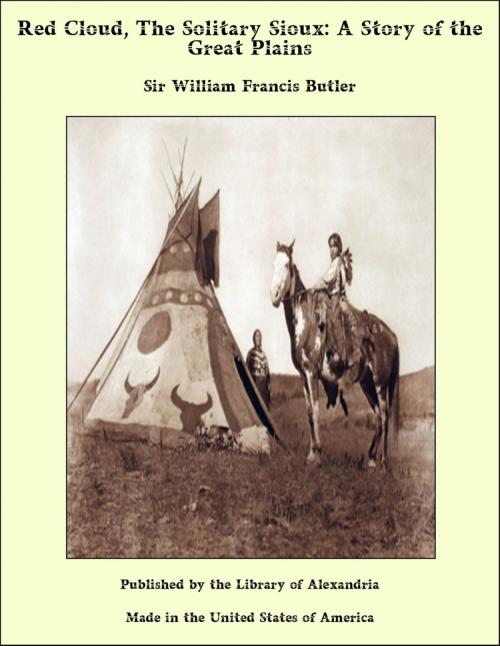Red Cloud, The Solitary Sioux: A Story of the Great Plains
Nonfiction, Religion & Spirituality, New Age, History, Fiction & Literature| Author: | Sir William Francis Butler | ISBN: | 9781465621450 |
| Publisher: | Library of Alexandria | Publication: | March 8, 2015 |
| Imprint: | Language: | English |
| Author: | Sir William Francis Butler |
| ISBN: | 9781465621450 |
| Publisher: | Library of Alexandria |
| Publication: | March 8, 2015 |
| Imprint: | |
| Language: | English |
Far back as I can remember anything I can remember our cottage in Glencar. It was a small thatched house, with plenty of June roses and white jessamine trailing over two sides of it, through wooden trellis-work. The ground rose steeply behind the house, until the trees that covered it gave place to scattered clumps of holly bushes, which finally merged into open mountain, heather-covered, and sprinkled here and there with dwarf furze bushes. In front of the cottage the little lawn sloped downwards to a stream, the bed of which was strewn with great boulders of rock, which were bare and dry in summer, but in winter scarcely showed over the surface. Between the big rocks there were pools and shallows, in which trout rose briskly at the midges in the early summer evenings. Whenever I think of that cottage home now, it seems to me to be always sunshine there. There must have been dark days, and wet ones, too, but I can’t call them to mind. There was a large flat rock in the middle of the lawn half way down to the stream; one end of this rock was imbedded in the earth, the other leant out from the ground, giving shelter underneath. The only dark thing I can remember about the whole place was that hollow under the big stone. I used to sit in there on the very hot days, looking out across the stream upon the one road that led from the outer world into Glencar. When the weather was not too warm I lay on the top of the rock, looking at the same view. The road came into the glen over a hill that was four miles distant from our cottage; you could see the white streak crossing the crest of ridge, flanked on each side by the dark heather mountain. You caught sight of the road again as it came down the hillside, and here and there at turns, as it wound along the valley to the old five-arched bridge over the Carragh river, and then disappeared around the hill on which our cottage stood. When in the summer days I used to lie on the rock, or beneath its shadows, I was always thinking of the country that lay beyond the boundary ridge, the land to which the white road led when it dipped down behind the hill: that was the outside world to me, the glen was the inside one. As I grew older I came to know more of the outside world; I was able to climb higher up the steep hill behind the house, to get beyond the holly bushes out into the heather, and at last one day I reached the mountain-top itself. That was a great event in my life. It took me a long while to get up; the last bit was very steep; I had to sit down often amid the rocks and heather for want of breath. At last I gained the summit, and sank down quite exhausted on an old weather-beaten flat rock; I was just ten years old that day. Thirty years have gone by since then. I have climbed many a lofty mountain, lain down for weeks alone in forests and on prairies, but never have I felt so proudly conscious of success as I did that day. It was my first view of the outside world. How vast it seemed to me. The glen, my world, lay below, winding away amid the hills. All the streams, all the lakes, were unfolded to my sight, and out beyond the boundary ridge was the great open country. That was on one side—the glen side; but as I turned round to look beyond the mountain I had come up, I saw a sight that filled me with utter astonishment. Below me on that side there lay another glen, smaller than ours; then the hill rose again, but not to the height of the ridge on which I stood; and then, beyond the hill, there spread a great, vast waste of blue water—out—out, until I could see no more, where the sky came down upon it—the end of the world. It was the sea!
Far back as I can remember anything I can remember our cottage in Glencar. It was a small thatched house, with plenty of June roses and white jessamine trailing over two sides of it, through wooden trellis-work. The ground rose steeply behind the house, until the trees that covered it gave place to scattered clumps of holly bushes, which finally merged into open mountain, heather-covered, and sprinkled here and there with dwarf furze bushes. In front of the cottage the little lawn sloped downwards to a stream, the bed of which was strewn with great boulders of rock, which were bare and dry in summer, but in winter scarcely showed over the surface. Between the big rocks there were pools and shallows, in which trout rose briskly at the midges in the early summer evenings. Whenever I think of that cottage home now, it seems to me to be always sunshine there. There must have been dark days, and wet ones, too, but I can’t call them to mind. There was a large flat rock in the middle of the lawn half way down to the stream; one end of this rock was imbedded in the earth, the other leant out from the ground, giving shelter underneath. The only dark thing I can remember about the whole place was that hollow under the big stone. I used to sit in there on the very hot days, looking out across the stream upon the one road that led from the outer world into Glencar. When the weather was not too warm I lay on the top of the rock, looking at the same view. The road came into the glen over a hill that was four miles distant from our cottage; you could see the white streak crossing the crest of ridge, flanked on each side by the dark heather mountain. You caught sight of the road again as it came down the hillside, and here and there at turns, as it wound along the valley to the old five-arched bridge over the Carragh river, and then disappeared around the hill on which our cottage stood. When in the summer days I used to lie on the rock, or beneath its shadows, I was always thinking of the country that lay beyond the boundary ridge, the land to which the white road led when it dipped down behind the hill: that was the outside world to me, the glen was the inside one. As I grew older I came to know more of the outside world; I was able to climb higher up the steep hill behind the house, to get beyond the holly bushes out into the heather, and at last one day I reached the mountain-top itself. That was a great event in my life. It took me a long while to get up; the last bit was very steep; I had to sit down often amid the rocks and heather for want of breath. At last I gained the summit, and sank down quite exhausted on an old weather-beaten flat rock; I was just ten years old that day. Thirty years have gone by since then. I have climbed many a lofty mountain, lain down for weeks alone in forests and on prairies, but never have I felt so proudly conscious of success as I did that day. It was my first view of the outside world. How vast it seemed to me. The glen, my world, lay below, winding away amid the hills. All the streams, all the lakes, were unfolded to my sight, and out beyond the boundary ridge was the great open country. That was on one side—the glen side; but as I turned round to look beyond the mountain I had come up, I saw a sight that filled me with utter astonishment. Below me on that side there lay another glen, smaller than ours; then the hill rose again, but not to the height of the ridge on which I stood; and then, beyond the hill, there spread a great, vast waste of blue water—out—out, until I could see no more, where the sky came down upon it—the end of the world. It was the sea!















